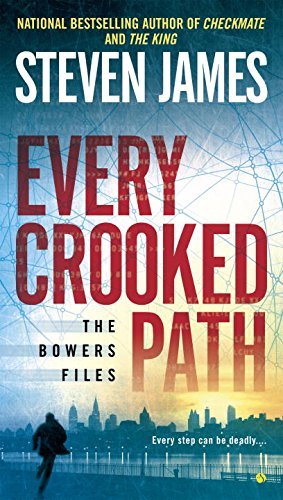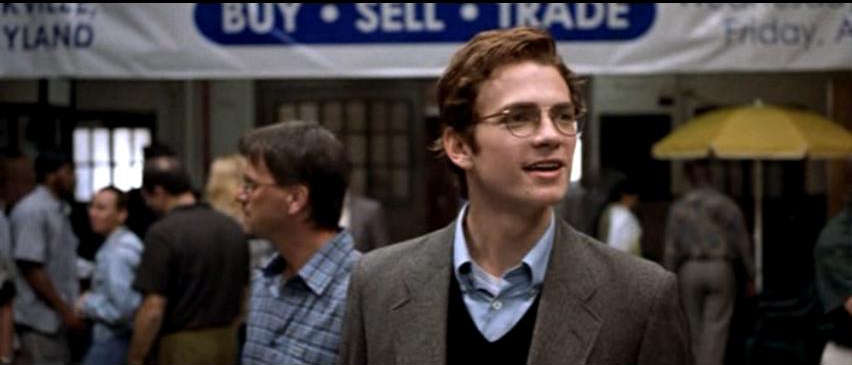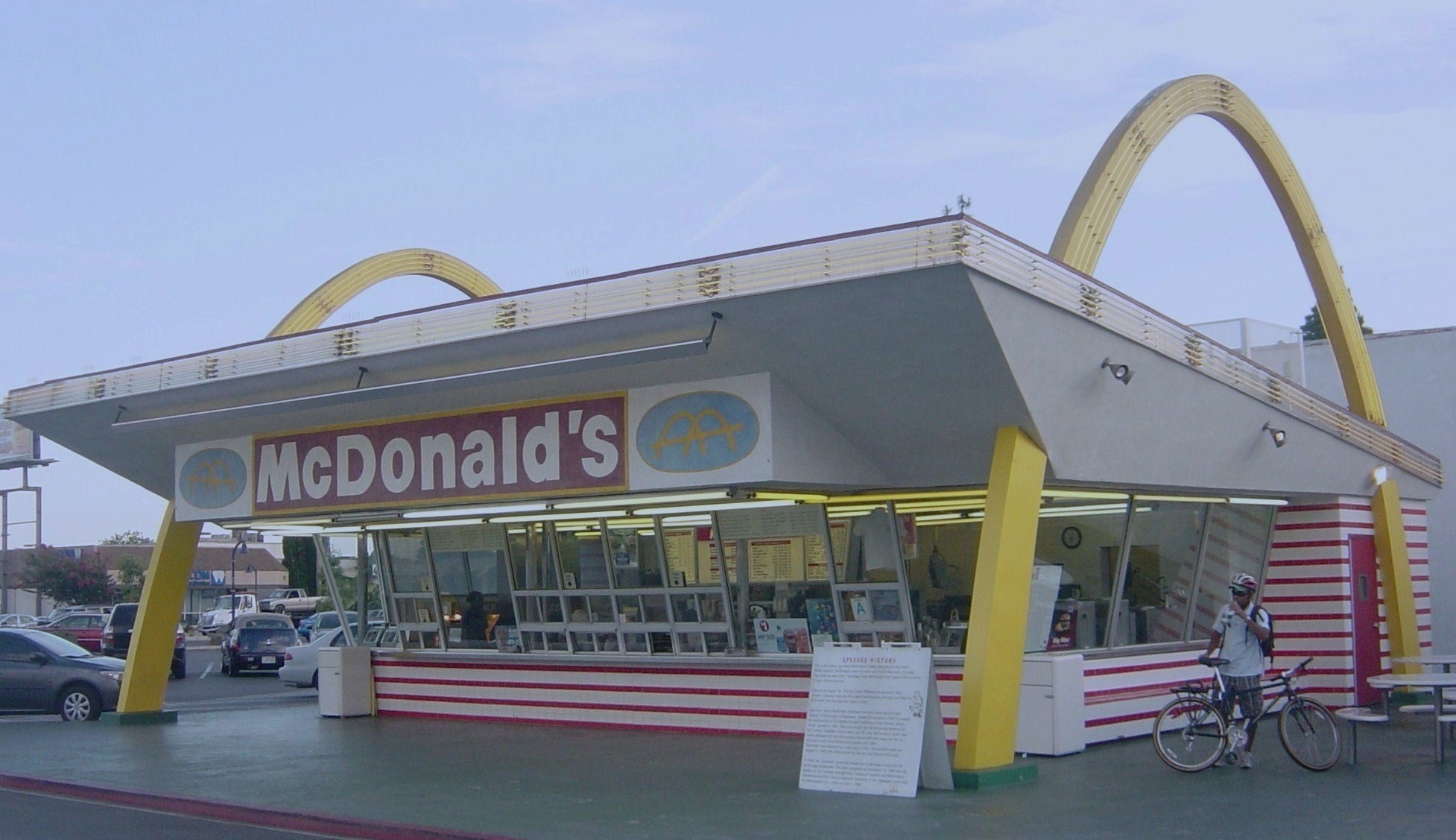Review: 'Every Crooked Path' by Steven James
 When my favorite stop on I-95 in North Carolina ceased selling paperbacks because the distributor folded, they offered to sell me the spinrack and the 24 well-thumbed books left on it. I ended up with some thrillers I otherwise would have missed, like this one. I love the rack but wish I'd missed this book.
When my favorite stop on I-95 in North Carolina ceased selling paperbacks because the distributor folded, they offered to sell me the spinrack and the 24 well-thumbed books left on it. I ended up with some thrillers I otherwise would have missed, like this one. I love the rack but wish I'd missed this book.
Every Crooked Path is a convoluted novel with slapdash pacing, thin characterization and characters who speak in the same voice -- a trait most excruciating when the protagonist attempts to bond across the generation gap with his girlfriend's sullen 15-year-old daughter. FBI agent Patrick Bowers is hunting a dark web child sex trafficking group, a disturbing subject the author tries to soften by being short on harrowing details. That works, but the logic of the case doesn't. One thing that did work was a character suffering a breakdown from a job watching videos of child exploitation for a safety group. That has become an all-too-real problem for social media moderators at Facebook.
Stephen Glass Couldn't Get Away with It Today
The 2003 movie Shattered Glass stars Hayden Christensen as Stephen Glass and tells the story of how he was exposed as one of the biggest frauds in the history of American journalism. I caught the film for the first time recently on HBO.

I followed the events of the film closely when they occurred in 1998. I liked that Glass was caught by an online reporter, Adam Penenberg at Forbes Digital Tool, with help from colleagues Om Malik and others. Back then it was not respected to report for a web publication. By contrast Glass was a star at The New Republic and it held huge mainstream cred.
Penenberg brought Glass down through the tedious process of checking his sources on that story. He couldn't find any. Glass made up a fake hacker with fake parents, a fake company, a fake police organization, fake advocacy group, fake law proposed in 21 states, fake hacker's group and a fake convention.
Although this is an era where completely fake websites share fake news stories that are spread by millions, it would be tougher now for someone like Glass to get away with what he did in the 1990s. If an attention-grabbing story quotes people and organizations, readers will expect to find a presence for them on social media. The more who can't be found, the more suspicious the story will appear.
Penenberg recounted the reporting he had to do to see if Glass made up all those people and groups:
Our first step was to plug Jukt Micronics into a bunch of search engines. We found no web site, odd for a "big-time software firm." Our next step was to contact the Software Publishers Association of America. Nothing. Next on our list was the California Franchise Tax Board. An official from the Tax Board confirmed that Jukt Micronics had never paid any taxes. Further investigations revealed that Jukt Micronics, if it existed at all, was not listed under any of California's 15 area codes. Sarah Gilmer from the office of the California Secretary of State said there was no record of the company, "as a corporation, a limited liability or limited partnership."
Today, he wouldn't need to work the phones so hard. Social media is so pervasive that a fake source is going to stand out if it lacks any web presence, social media accounts or friends who can be contacted to verify their existence.
Enter the TV Deadpool Contest
For the last 10 years I've been competing in the Ted Marshall Open, a contest to predict 10 shows on broadcast TV that will be cancelled during the coming season. Mike Burger began the game 17 years ago as the Alison La Placa Open, naming it after a great comedic actress who starred in the short-lived shows Suzanne Pleshette is Maggie Briggs, Duet, Open House, Stat, The Jackie Thomas Show and Tom.
When La Placa lost her sense of humor about the name in 2008 and sent a cease and desist letter, the contest was renamed Ted Marshall in possible tribute to fellow acting unfortunates Ted McGinley and Paula Marshall.
This year Burger decided not to run the contest. Because the fall season wouldn't be the same without the game, I've launched TVDeadpool.Com. The contest rules are the same: Pick 10 shows, rank them from 10 to 1 and receive points when they are cancelled. Guess a showcase showdown value on The Price is Right as a tiebreaker. There isn't much to look at yet, but there will be a leader board and a blog with renewal/cancellation updates.
We could use some more players as well as help getting the word out. The deadline to enter is this Sunday at 11:59:59 p.m.
'The Founder' Portrays Ray Kroc as a Hamburglar
I love biopics. I completely believe them when I'm watching, then spend the next few days scouring the web for how much nonsense I accepted as fact.
After hearing that The Founder was on Netflix, last night I watched Michael Keaton portray Ray Kroc as he pried McDonald's away from the brothers who founded the original restaurant and invented its fast food techniques. The film portrays Kroc as a villain and the brothers as heroes.
Judging strictly by the film itself, and not the actual facts, I question the idea that Dick and Mac McDonald were horribly mistreated by Kroc, though Nick Offerman and John Carroll Lynch are fantastic as those brothers at eliciting sympathy. Don't read any further if you want to avoid spoilers.
When Kroc comes into the picture, the McDonald brothers are shown running a highly successful local restaurant in San Bernardino, California, that they have tried and failed to launch as a franchise. While they continue to run that restaurant, we see Kroc crossing the country and working indefatigably to attract franchise owners. All the efforts to build the business and keep franchise owners in line are credited to Kroc. The McDonalds only show up to fight something Kroc wants to do or express worry that he's taking advantage of them.
Given that scenario as depicted, there's no reason to believe that McDonald's ever goes national without Kroc. The brothers are shown as good-natured, good-hearted and completely small time.
So when Kroc makes his move to take over, he's trying to wrest control of a business with hundreds of restaurants that he largely built on his own. It's hard to feel like he stole something that would never have existed without him.
At the end of the movie, Kroc does two things that make him look like a complete bastard. According to Lisa Napoli, the author of the biography Ray and Joan, one of these is true and the other false.
Photo of the oldest operating McDonald's in Downey, Califoria, taken by Ruth Hara available under a Creative Commons Attribution 2.0 Generic (CC BY 2.0) license.
You Should Be Reading Shelley Powers

Shelley Powers has a lyrical blog post up on Burningbird called The Rule of Small Deer. I'd quote it but it should be appreciated in its entirety.
Powers is known as a techblogger and computer book author, but she's also an advocate for animal welfare who does some terrific original reporting on the subject. You can find recent posts in her blog's Critters category.
The way she ended one post on the unjust elimination of a wolf pack in Washington state serves as excellent general advice:
Don't accept this. Get in people's faces. Be mad. Be vocal. Be loud. And if being loud means to hell with respectful and civil discourse, so be it.
We Have Always Been at War with Comment Spammers
This site continues to get 10-30 comment spams a day, along with the occasional comment to an old post that makes it worthwhile to continue offering the opportunity for reader feedback. I'm thinking about switching to a comment form in which the only way to add bold, italics and links is to use buttons that add the formatting in a markup scheme that nobody else on the planet uses. Comments that use HTML or Markdown would be rejected.
Coming up with oddball and ultimately futile anti-spam techniques is a long tradition around here. In 2006 I invented comment flak, a system of putting fake form components on a page and hiding them with CSS so that their use caught spammers. It did not work.
Creator of cURL Denied Entry to U.S.
 Daniel Stenberg, a Mozilla senior network engineer and the creator of the cURL open source library, has been denied entry to the United States, he revealed early Tuesday morning in a tweet.
Daniel Stenberg, a Mozilla senior network engineer and the creator of the cURL open source library, has been denied entry to the United States, he revealed early Tuesday morning in a tweet.
Stenberg was coming for business to All Hands, a twice-yearly Mozilla conference bringing together staff and volunteers that began Monday. An hour after tweeting, "On my way to San Francisco and Mozilla," he said this:
That took an unexpected turn. I'm denied entry by ESTA out of the blue. So ... no trip for me I suppose. Shocked really. What a disappointment. ... I can't think of a single good reason why they would do this.
ESTA is the Electronic System for Travel Authorization, which is used by U.S. Customs and Border Protection. Stenberg said that he was checking in at Arlanda Airport north of Stockholm when told he couldn't fly. "I couldn't check in online for unknown reasons so I approached the counter, where they informed me," he said. No reason was given for the refusal.
The cURL library is used by software to download data across websites and web services using HTTP, FTP and many other protocols. I've used it on many of my sites, often to get RSS feeds. The cURL site states, "It is also used in cars, television sets, routers, printers, audio equipment, mobile phones, tablets, set-top boxes, media players and is the internet transfer backbone for thousands of software applications affecting billions of humans daily." The project had its 20th anniversary earlier this year on April 8.
Update: Stenberg has blogged about the experience and the support he's received across the programming world. There's still no explanation for his exclusion.



